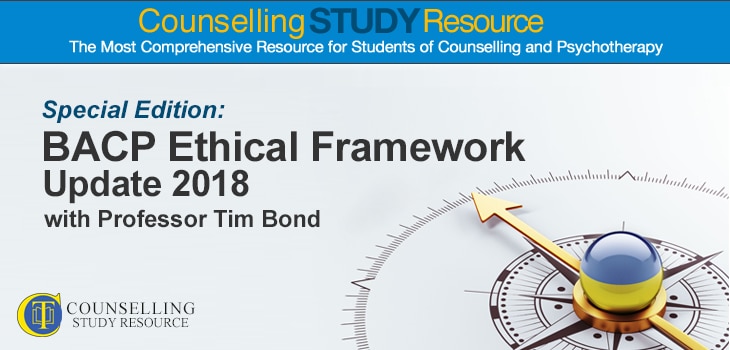Q: So what prompted the BACP to update the Ethical Framework?
A: First, it is a living document and so needs to be updated frequently, since the profession – including the regulatory environment – is changing rapidly. Also, adding a new section in the last edition – ‘Our commitment to clients’ – was a bold experiment. In the new version, a freestanding one-side document has been added on this commitment; this can be printed separately and given to clients as a guide to what they can expect from practitioners who are BACP members.
Q: Who has informed the content of the new Ethical Framework?
A: It’s important that this is not imposed on us, but is developed together through professional discussion. Accordingly, the BACP analysed views from a range of sources, including annual monitoring reports from accredited courses, queries from clients, and comments from practitioners on the previous version (including a survey of members that brought in 1,400 responses). In short, the new Ethical Framework has been driven by listening to grass-roots views.
Q: Is the Ethical Framework paving the way to regulation of the counselling and psychotherapy profession?
A: There are currently no plans for it to have this role, although of course the Professional Standards Authority does regulate a number of professional registers in the counselling profession, including that of the BACP. The Ethical Framework is not a strict code or set of rules, as it’s designed to fit a range of client groups and professional roles, serving as a scaffold in which every member can find their own place.
Q: What are the main changes in the new edition of the Ethical Framework?
A: Alongside numerous minor changes and the addition of a single-sided version of ‘Our commitment to clients’, as described above, there are several new sections, including on breaks and endings (e.g. the sudden illness or death of a practitioner), more detail on confidentiality (including in light of the new General Data Protection Regulations: GDPR), a reinstated section on team-working, and an updated glossary.
Q: How will the new Ethical Framework impact trainees?
A: Another new section has been added for trainees; this aims to balance trainees’ need to experiment, make mistakes and learn with the importance of providing a professional standard of service to clients. This balance is made possible by the support from tutor, placement provider and supervisor. The new document also requires that clients are informed when their counsellor is a student. The benefits of this could also be pointed out to clients – for example, that students are likely to be especially alert, vigilant and well supported.
Q: Might trainee counsellors ever be paid while on placement?
A: There is no ethical reason why this could not be so, though the existing difficulty of finding a placement may make this unlikely in the foreseeable future. Students being unpaid is a historical situation, not an ethical one.
Q: What does it mean in practice to keep notes that are ‘adequate, relevant and limited’?
A: The language used here relates directly to the GDPR. ‘Adequate’ means appropriate for their intended purpose; ‘relevant’ means clearly relating to work taking place with the client; and ‘limited’ means that the record should not be over-full (i.e. should be limited to what is needed to serve the purpose).
Q: Do you have to show clients your process notes if they ask to see them?
A: Clients have the right to see only notes in which they are identifiable (whether by name or a code). So if you include process notes in your client record, then they could see them if they wished, but if you keep your own (maybe journal-style) notes on process in which no client is identifiable, then you would not have to show them these.
Q: How can counsellors use the Ethical Framework to build their relationship with clients?
A: In addition to digesting the material on boundaries and building trust in the therapeutic relationship, you could give clients the one-side sheet describing our commitment.
Q: What else does the BACP do to support counsellors?
A: It talks to government bodies, seeks to secure funding for counselling, promotes the profession, involves voluntary bodies, undertakes and supports relevant research, and publishes journals. Its website also includes the Good Practice in Action resources, designed to add more detail than is possible in the Ethical Framework – for example, on contracting, online working, confidentiality and record-keeping. Last but not least, the BACP offers opportunities for networking, so that practitioners can share experiences.
Finally, Tim invites any listeners who are BACP members and have views on what they would like to see in the next edition of the Ethical Framework to email these in on bacp@bacp.co.uk.
You can download Rory’s handout giving five key points on the new Ethical Framework for the Counselling Professions here. Alternatively, it is available in the Handouts Vault and Counselling Study Resource (CSR).



